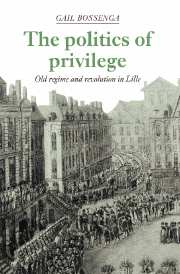Book contents
- Frontmatter
- Contents
- List of figure and tables
- Preface
- List of abbreviations
- 1 Monarchy, privilege and revolution: the problem and setting
- 2 State finance and local privileges
- 3 Corps, bureaucracy and citizenship: the case of the Bureaux des Finances
- 4 The excluded nobility and political representation
- 5 A nation of equals: the demands of the Third Estate
- 6 Uses of a regulated economy: the state against itself
- 7 Corporate privilege and the bourgeoisie
- 8 The abolition of the guilds
- 9 The corporate heritage and the well-ordered state
- 10 Conclusion
- Notes
- Bibliography
- Index
4 - The excluded nobility and political representation
Published online by Cambridge University Press: 01 October 2009
- Frontmatter
- Contents
- List of figure and tables
- Preface
- List of abbreviations
- 1 Monarchy, privilege and revolution: the problem and setting
- 2 State finance and local privileges
- 3 Corps, bureaucracy and citizenship: the case of the Bureaux des Finances
- 4 The excluded nobility and political representation
- 5 A nation of equals: the demands of the Third Estate
- 6 Uses of a regulated economy: the state against itself
- 7 Corporate privilege and the bourgeoisie
- 8 The abolition of the guilds
- 9 The corporate heritage and the well-ordered state
- 10 Conclusion
- Notes
- Bibliography
- Index
Summary
While corps of venal officeholders, such as the Bureaux des Finances, saw their functions and privileges whittled away at the hands of the monarchy, corporate bodies with representative functions, such as provincial estates, faced different challenges. The estates of Walloon Flanders, as we saw earlier, had been drawn into a tense alliance with the king. The crown guaranteed their right to rule and closed off access into the corps, but placed growing financial demands on the province. The members of the estates needed the monarchy to uphold their authority, but faced the political consequences posed by royal fiscal requirements. Owing to the monopoly of power by the estates and new forms of taxation, irresolvable constitutional battles plagued the province throughout the eighteenth century. The following account illustrates how closed, royally supported representative bodies, rising taxes, and problems in municipal finances helped to estrange the Flemish nobility from the structures of power in the corporate regime.
Most nobles in Walloon Flanders were of relatively recent origin, their ancestors having engaged in trade or manufacture. In the late eighteenth century the nobility formed approximately one-half of one percent of the population in the châtellenie and 1·6 percent of the urban population, but they owned 31 percent of the land in French Flanders. Since many of the nobles had urban and mercantile roots, their holdings were particularly extensive in the area directly surrounding Lille. According to capitation records, the number of noble families in the chdtellenie rose from 145 to 170 between 1730 and 1789; the number in the city of Lille increased from 151 to 195 between 1695 and 1789.
- Type
- Chapter
- Information
- The Politics of PrivilegeOld Regime and Revolution in Lille, pp. 70 - 88Publisher: Cambridge University PressPrint publication year: 1991



